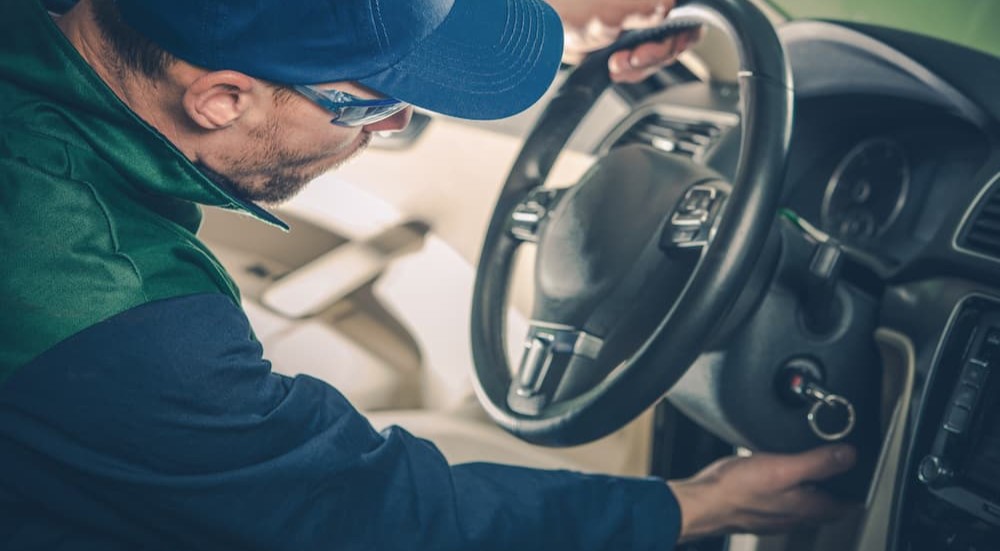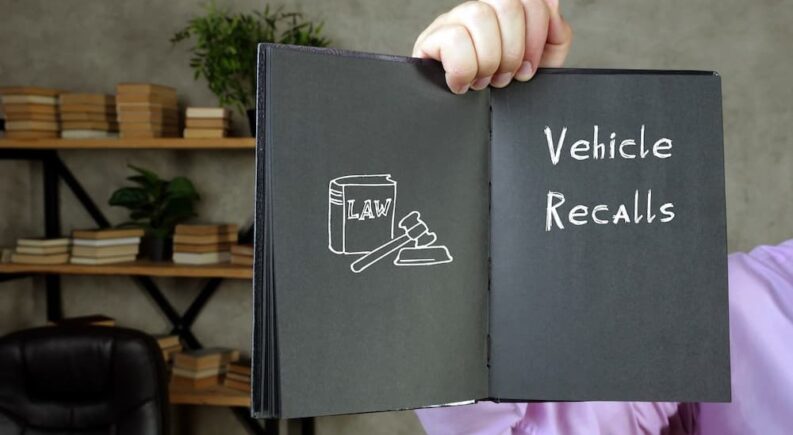Customers looking for a Ford service center don’t always need a routine service like an oil change or tire rotation. Sometimes, you might need these trusted mechanics to handle a recall for your car, truck, or SUV. What is a recall? When did manufacturers start issuing them, and why? More importantly, why should you never ignore a recall for your vehicle? We have those answers and more.
What Is a Recall?
A recall is an official notification that an issue or defect with your vehicle could affect your safety in the driver’s seat. Recalls are issued by the vehicle manufacturer or the National Highway Traffic Safety Administration (NHTSA), the federal organization that sets vehicle safety and manufacturer standards across the automotive industry. Recalls can run the entire spectrum of issues, from a problem with how the windshield wipers operate to a defect with the seatbelts, tires, or another major component on your vehicle. In any case, the recalled component does not meet the minimum safety requirements and must be replaced.
When Did Manufacturers Start Issuing Recalls?
Henry Ford put the world on wheels in the early 20th century with the Model T, forever changing how we get from point A to point B. The automobile replaced the trusty horse as a primary means of transportation, igniting an onslaught of new models that promised more power and capability. The burgeoning automobile industry made cars and trucks accessible to more drivers, which also meant more fatalities behind the wheel. By the 1960s, the leading cause of death for Americans under age 44 was automobile accidents. The problem was too significant to ignore.
In 1966, the government passed the National Traffic and Motor Vehicle Safety Act to reduce automobile-related fatalities. The act established industry-wide safety standards for automakers, holding every manufacturer accountable for improving the design and operation of their vehicles. The act led to the creation of the National Highway Safety Bureau, which became the National Highway Traffic Safety Administration in 1970. The NHTSA established regulatory programs and widespread regulations, requiring automakers to issue recalls for vehicles and any components that failed to meet those standards.

How Does a Recall Occur?
A recall occurs when a vehicle no longer meets the minimum requirements outlined by the Federal Motor Vehicle Safety Standards, which are designed to optimize driver safety by ensuring the quality and operability of every automotive component in the event of a crash. Recalls can be initiated in multiple ways. For example, drivers can report vehicle safety concerns to the National Highway Traffic Safety Administration. In other cases, manufacturers quickly become aware of the problem and issue a recall voluntarily before the NHTSA is involved.
The NHTSA reviews every complaint with a preliminary screening to determine the potential defects and next steps. In many instances, the screening leads to an investigation, where NHTSA officials gather the complaints and vital information from the manufacturer. The manufacturer has the opportunity to respond to the inquiry and provide a resolution for the defect, leading to the final step of the process: recall management. During this last step, recalls are issued, and the NHTSA’s Recall Management Division oversees the recall process to determine the scope and success of the recall or if further adjustments or modifications need to be made.
How Will You Know If Your Vehicle Has a Recall?
Manufacturers are required to notify every owner of a recall via first-class mail. The recall notice includes a description of the defect and the associated warnings or risks. For example, a manufacturer might recall the airbags in a best-selling SUV and issue a “Do Not Drive” warning because the issue hinders the operability of the airbags and dramatically reduces your safety in the driver’s seat.
Beyond outlining the issue and related safety concerns, the recall notice explains how and when the manufacturer will address the issue. The letter will walk you through the steps to initiate the recall process, letting you know if the replacement parts are currently available or, if not, provide an estimate of when you can expect them at your local service center. Drivers can then contact their service team to schedule an appointment to handle the recall.
Can You Find Recall Information on a Vehicle You Don’t Own?
Driver safety is a top priority for the National Highway Traffic Safety Administration, which is why the organization provides an extensive suite of tools to give you the information to make an informed and confident purchase. You can use the NHTSA’s online tool to look for recalls using the Vehicle Identification Number (VIN). This search gives you helpful information before you purchase a used vehicle, making it easier to have the recall and any related issues remedied before the sale is final.
Are Recalls Limited to Minor Automotive Components?
Any component can be recalled but recalls fall into two categories: safety- and non-safety-related. Safety-related recalls impede your safety because the component is defective, like an airbag that randomly deploys without impact, a wiring system that causes a fire, or a windshield wiper assembly that doesn’t operate correctly and hinders your visibility. These safety-related recalls also extend to seat belts, car seats, booster seats, buckles, wheels, engine components, the steering wheel, and other steering-related parts.
Recalls that are not safety-related can run the entire gamut of your vehicle. For example, the manufacturer may issue a recall because a body panel on your model is prone to rust or the paint quality is known to cause blemishes. Sometimes, a manufacturer might issue a recall on the radio or infotainment system because of reported failures.
Since recalls can affect every major vehicle component, the extent of remedying the recall varies. Usually, a manufacturer can repair the issue by replacing the defective components. However, in extreme cases, the repair may not be feasible, and the manufacturer will replace your vehicle with a comparable model or offer a refund, which is determined based on the vehicle’s purchase price and any associated depreciation.

How Much Will a Recall Repair Cost?
Manufacturers cover recall-related repairs on vehicles less than 15 years old from when the defect was established. For example, a defect found in 2015 means the manufacturer covers recalls on models built between 2000 and 2015. Sometimes, you may cover the cost of a recall repair without realizing it because you haven’t received an official recall notification in the mail. In this case, the manufacturer is required to reimburse you for the cost of the repairs.
Keep in mind that as you initiate the recall process, you’re entitled to have the issue remedied at no cost and on a reasonable timeline. Dealerships and their respective service centers should not charge you any recall-related expenses since most manufacturers typically have a contractual agreement that requires their dealerships to honor the recall and remedy process. There is one caveat, however, and that is what’s considered a reasonable timeline. There may be a delay between when you receive the recall notification and when your local service center has the needed parts to make the repairs.
Can You Drive a Car With a Recall?
Driving a vehicle with a recall depends on the nature of the recall itself. If the recall is non-safety related, there’s a good chance that you can still get behind the wheel until the recall is remedied. However, the manufacturer may issue a “Do Not Drive” warning in extreme cases because the recall is safety-related and significantly impacts your safety in the driver’s seat. When this happens, finding another means of transportation is best until the recall is fixed.

